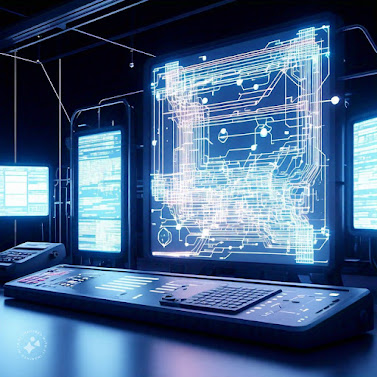In the era of decentralization and blockchain, Decentralized Autonomous Organizations (DAOs) have emerged as a revolutionary way to organize and govern collective decision-making. Unlike traditional organizations, DAOs rely on smart contracts and blockchain technology to ensure transparency, accountability, and efficiency in their operations. This blog delves into the governance structures of DAOs, their voting mechanisms, and how they can transform governance globally, especially in combating corruption.
What is a DAO?
A DAO is a blockchain-based organization governed by rules encoded in smart contracts. These organizations operate without centralized leadership, relying instead on community-driven decisions. The foundational principles of a DAO include decentralization, transparency, and autonomy.
DAOs differ significantly from traditional organizations. While conventional entities rely on hierarchical leadership and opaque decision-making processes, DAOs empower their members by giving them direct control over governance decisions. Prominent examples include MakerDAO, Uniswap, and Aave, each showcasing unique approaches to decentralized governance.
Governance in DAOs
Governance in DAOs is a cornerstone of their operation. Members, typically represented by token holders, participate in decision-making processes through voting. These decisions can range from protocol upgrades to fund allocation.
Token-Based Governance
In many DAOs, governance power is proportional to the number of tokens a member holds. While this system ensures active participation, it raises concerns about the influence of large token holders and potential centralization risks.
Decision-Making Processes
DAO governance processes are often automated through smart contracts. Once a proposal reaches a predetermined threshold of approval, the smart contract executes the decision automatically. This eliminates delays and ensures that decisions are transparent and tamper-proof.
Voting Mechanisms in DAOs
Voting is the backbone of DAO governance. Here are some common voting mechanisms used:
- Simple Majority Voting: The proposal with the most votes wins. It’s straightforward but can be prone to voter apathy.
- Quadratic Voting: Balances influence by allowing members to allocate voting power proportionally, addressing issues of unequal representation.
- Delegated Voting: Members delegate their votes to trusted representatives, which can increase participation while ensuring expertise-driven decisions.
Smart contracts automate these voting mechanisms, ensuring transparency and preventing tampering.
The Anti-Corruption Potential of DAOs
Corruption in traditional voting and governance systems is a persistent issue, especially in countries with weak institutional frameworks. DAOs offer a solution through their inherent transparency and decentralization.
Transparency in Voting
Blockchain’s immutable ledger ensures that every vote is traceable and verifiable. This eliminates the possibility of vote tampering, ballot stuffing, or other fraudulent practices that plague traditional elections.
Decentralized Power
By removing centralized authorities, DAOs minimize opportunities for manipulation. Decisions are made collectively, reducing the influence of corrupt intermediaries.
Real-World Impact
Blockchain voting has already been piloted in some governance scenarios. For example, Estonia’s blockchain-based e-governance system has demonstrated how technology can ensure election integrity. Similarly, DAOs could revolutionize governance in countries like Venezuela or Nigeria, where corruption has eroded trust in democratic processes.
Benefits for Corruption-Prone Countries
DAOs can play a transformative role in countries grappling with systemic corruption. Here’s how:
Restoring Trust in Governance
By ensuring election transparency and publicly verifiable results, DAOs can rebuild citizen trust in democratic systems. Blockchain’s immutable nature guarantees that results are fair and untampered.
Reducing Bureaucratic Corruption
DAOs can be used to allocate public funds transparently. Smart contracts ensure that funds are spent according to the community’s decisions, reducing opportunities for embezzlement.
Empowering Communities
DAOs give citizens direct voting power on key issues, bypassing corrupt representatives. This grassroots approach ensures that decisions align with the community’s needs and priorities.
Challenges and Criticisms
While DAOs offer numerous advantages, they are not without challenges:
- Low Voter Participation: Many DAOs struggle with voter apathy, leading to decisions made by a small subset of members.
- Centralization Risks: Token-based governance can lead to power concentration among large token holders.
- Technical Vulnerabilities: DAOs rely on smart contracts, which can be exploited if not thoroughly audited.
Addressing these challenges is crucial for DAOs to reach their full potential.
The Future of DAO Governance
The future of DAOs lies in innovation and adaptation. Emerging concepts like soulbound tokens and reputation-based voting aim to address issues of centralization and voter apathy. As DAOs evolve, they have the potential to redefine governance not just in blockchain, but also in traditional systems.
However, regulatory challenges loom large. Governments worldwide are grappling with how to classify and regulate DAOs. Striking a balance between innovation and compliance will be key.
Conclusion
Decentralized Autonomous Organizations represent a paradigm shift in governance. By leveraging transparency, automation, and community-driven decision-making, DAOs have the potential to combat corruption and empower individuals globally. For countries plagued by corruption, DAOs offer a blueprint for fair, transparent, and inclusive governance. As this technology continues to evolve, its impact on society could be profound, ushering in an era of truly decentralized democracy.


